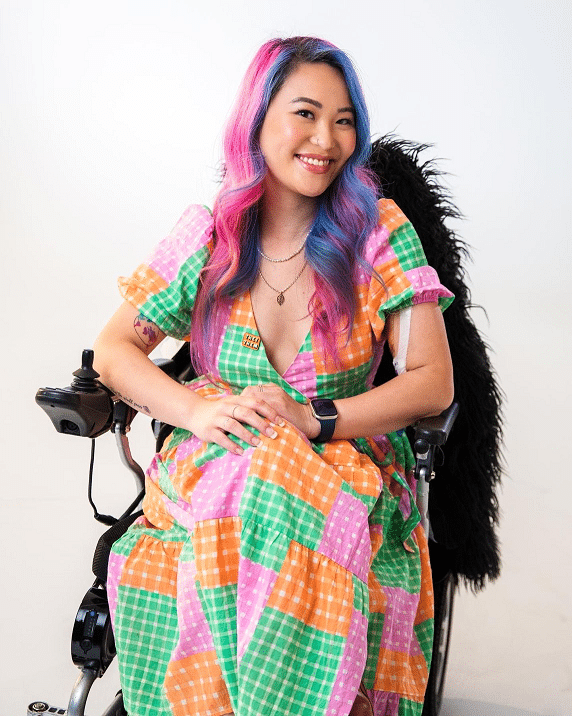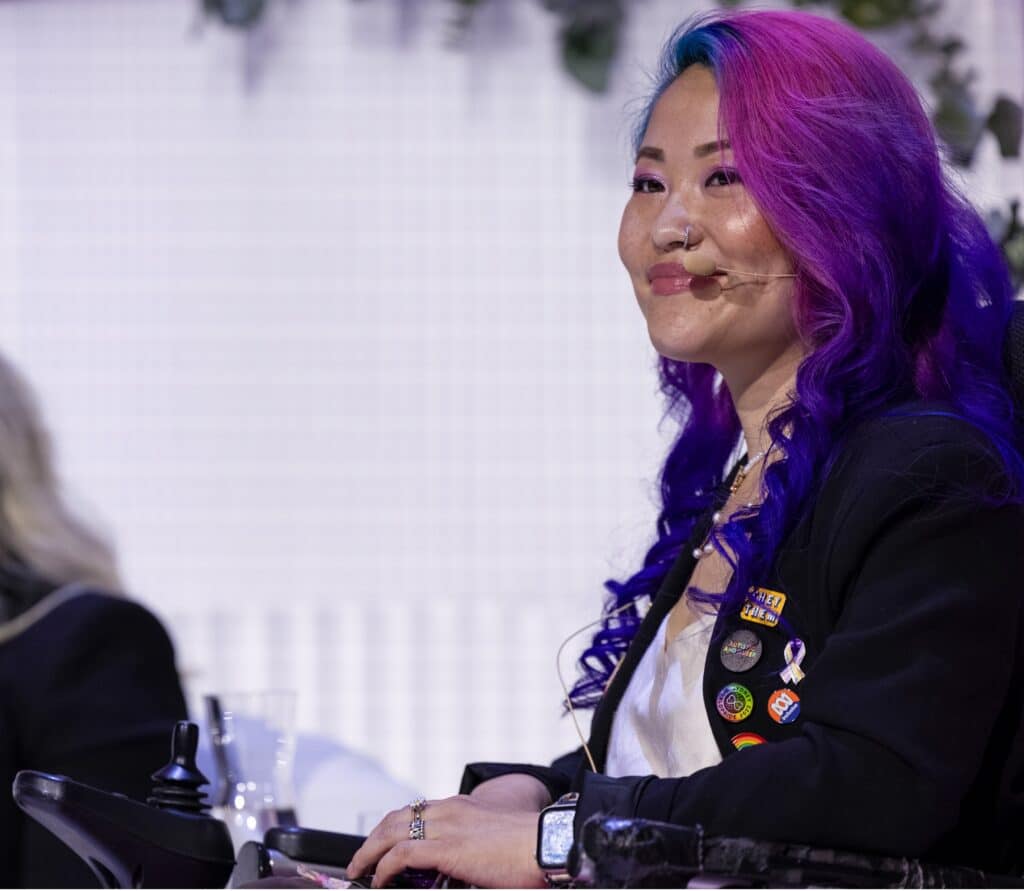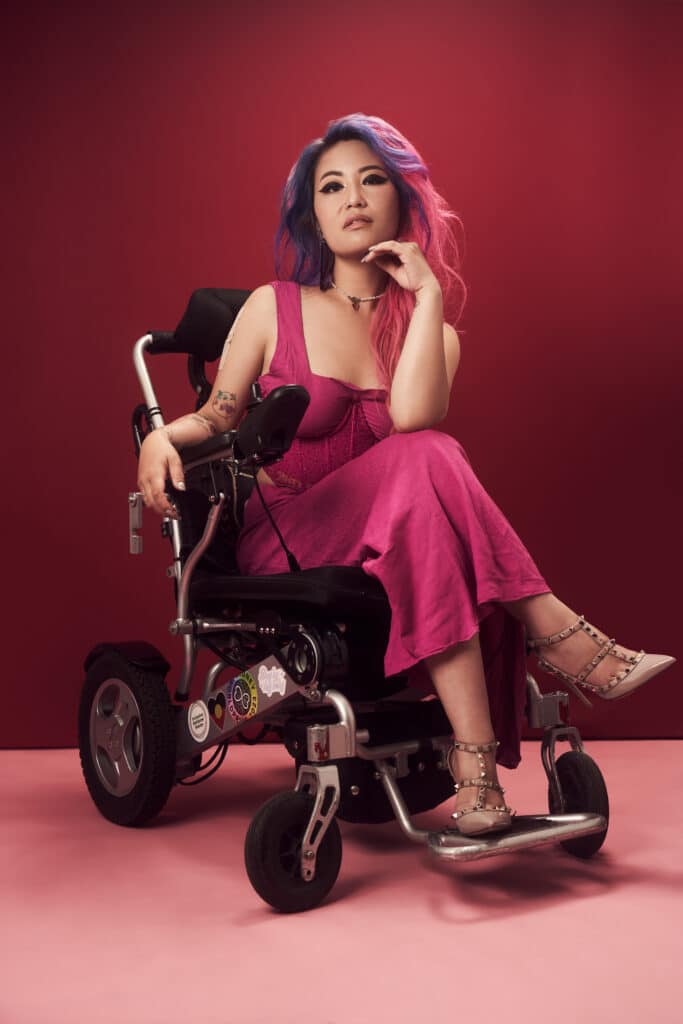Whether they like it or not, Akii Ngo’s existence is a resistance – a resistance to everything that so far has failed to find a place for them.
“As a person of colour, a person from a refugee background, a trans and gender diverse individual, living with complex disabling pain, numerous chronic illnesses and disabilities (hidden and apparent) – I’m often put in the ‘too-hard basket’ because of all those different identities and intersections,” Akii told Women’s Agenda recently.
“My existence is a resistance whether or not I like it to be – but I think I can utilise that to really recognise the absolute need for improved representation across the mainstream.”
Akii Ngo is an international multi-award-winning advocate, activist, trainer and educator on intersectional representation. They live with chronic pain and several debilitating illnesses, they are neurodivergent (Autistic, ADHD & CPTSD) and they are a person of colour, coming from a refugee, culturally diverse and racially marginalised background. They are also part of the LGBTQIA+ and gender-diverse community as a trans non-binary queer person.

The lack of people like Akii in the mainstream world inspired them to step up and be the representation they never experienced or saw throughout their life. Next month, Akii will give the keynote address at the Australian Women’s Leadership Symposium in Melbourne on the 9th August.
But genuine, intersectional representation in workplaces, media and institutions still isn’t perfect – in fact, it can more often than not feel tokenistic.
Akii would know – they’ve been there too many times to count.
“I’ve been in situations where I am the token everything,” Akii said. “And that really does make it so difficult, and you do get burnt out.”
But if anyone is going to fight to make change, if anyone is going to improve representation across the board, it’s Akii.
The personal and the political
For Akii, everything that inspired the work they do now comes from lived experience.
“A lot of the work I do as an advocate and activist in my professional life, it also crosses over in my personal life,” they said.
“I have to constantly advocate for myself, whether that be in a medical setting, an employment setting, an everyday life setting.
“You can’t turn off your disability, you can’t turn off your gender, your sexuality, your race.”
The feminist concept that “the personal is political” is exactly the life that Akii leads: in both their personal and professional life, every day is a “nonstop, constant uphill battle” to advocate for themself in a world that is not equitable for all.

“I talk a lot about equity rather than equality because you can’t give everybody exactly the same things and expect all their needs to be met,” Akii said.
“I am disabled by my environment and my chronic illnesses, so if there is accessibility to enter a building, or if my access needs are met, then the barriers associated with my contributions or my participation in society are decreased dramatically.
“It doesn’t remove the fact that I live with chronic pain – but it sure as hell does allow me to be in more spaces.
“I’m not here to take up space or take space away from anyone – I’m here to add and contribute to that space to make that space more welcoming.”
Tokenistic vs intersectional representation
An all-male, all-white, able-bodied, non-disabled panel with one diverse person often gets a bad wrap for how it looks. But the problem of tokenistic representation extends well beyond the look.
“There’s so much expectation put on that one person to represent so many,” Akii explained, “but it also doesn’t align with values of inclusion and diversity if you’ve just got one person representing everyone.”
Akii has been there – many times. It’s why they are so passionate about advocating for non-tokenistic, intersectional representation. And by “intersectional”, they don’t just mean ‘diverse’.
“Intersectionality is often a sexy word nowadays, and people often interchange it with diverse,” Akii said.
“Intersectionality is about the overlapping systems of oppression. Diversity is having diverse people, but they might not have intersectional identities.”
Akii said it’s important for people like them to be included in spaces where they can share their experience not for the look, but instead for the benefit of everyone’s understanding. After all, “you don’t know what you don’t know”.
“Until someone like myself who does live with multiple marginalisations and multiple identities really highlights some of these things,” they said.
Akii is looking forward to speaking at the Women & Leadership Australia Symposium in Melbourne. As a trans non-binary person, they don’t always feel welcome in women’s spaces.

“Trans and gender diverse people don’t take away space from women, they add to it and make the spaces more inclusive, equitable and intersectional,” Akii said.
“However, often due to misconceptions, misunderstandings, ignorance and bigotry, many women can feel threatened that trans women and gender diverse people, particularly those of us who are femme, are trying to ‘invade’ or take away their [women’s] space’ – which is untrue, we just want to belong and be represented.
“Having a platform and the ability to share my experiences both professionally and personally to people, like at this symposium, I think is a very important progressive way to highlight leaders in the community, and to add to people’s understanding of inclusion and equity for everyone.”
Not just words, but action
A key message from Akii for workplaces, media and institutions is this: less words, more actions.
In a workplace setting, “words” can look like an equal opportunity statement in the job application process, for example. Akii said many employers write such statements, but don’t follow up with policies and protocols in the workplace. Or they are reactive, rather than proactive in their inclusive, diversity, equitable and belonging practices.
“That has happened to me before,” Akii said. “I was made to feel like a burden for having access needs and requirements, even though they had advertised that they were an inclusive, equal opportunity workplace.”
Some don’t even hire diverse people, Akii said. This is particularly felt by the disability community: in 2018, while 80 per cent of Australians without a disability aged 15-64 were employed, just 48 per cent of people with a disability were employed.
“Being alive is expensive for everyone, like we also have to pay bills, rent, internet, transport and car and whatever else that, you know.. non-disabled, non-chronically ill people have to pay for, on top of additional expenses [like medications which can be very expensive, GPs, specialist doctors, scans and tests] – and yet we can’t even get employed,” Akii said.
Akii said to achieve genuine representation in these settings, employers must hire people with lived experience, or at least provide training to their staff on diversity, equity, intersectionality and inclusion.
“Your commitment can’t be just words,” Akii said. “They need to have actions.”
Akii Ngo is speaking at The Australian Women’s Leadership Symposium in Melbourne, on Friday 9 August. You can find out more information about the event here.
*Featured image: Akii Ngo facilitating a panel at a Chief Executive Women event. Credit: Supplied

